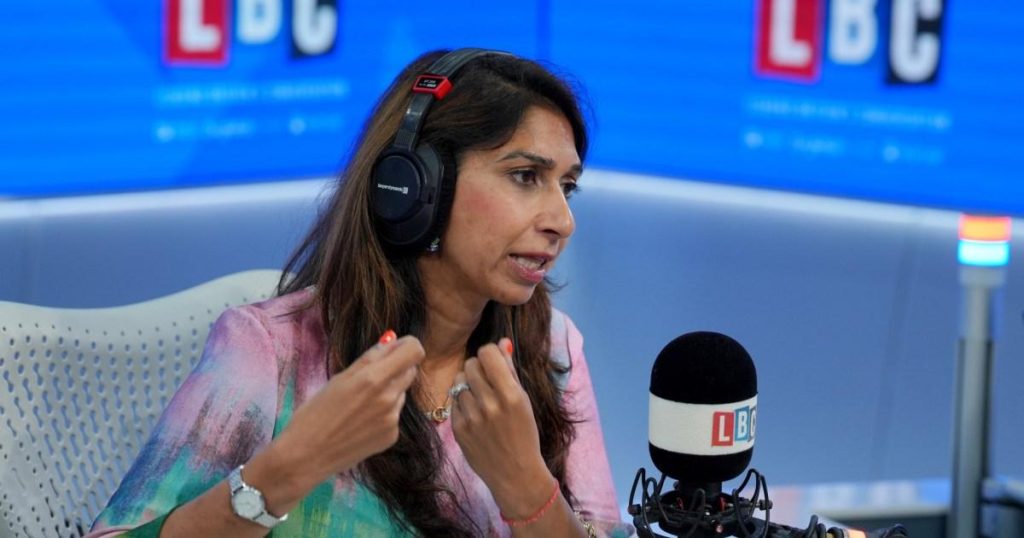Suella Braverman’s Geographical Gaffe: A Case of Mistaken Identity
Former Home Secretary Suella Braverman, a prominent figure in British politics and a one-time contender for the Conservative Party leadership, recently found herself in the midst of a geographical blunder that sparked widespread amusement and raised questions about her grasp of international relations. During a live radio interview on LBC, while discussing the importance of border control, Braverman cited Italy as a prime example of a country effectively securing its borders. She confidently asserted that Italy had constructed a wall on its land border with Turkey, a statement that quickly unravelled under scrutiny. In reality, Italy and Turkey share no land border, being separated by a considerable distance, approximately 700 miles at their closest points. A journey between the two countries would necessitate traversing several other nations, including Slovenia, Croatia, Bosnia and Herzegovina, Serbia, and Bulgaria. Even a sea route would involve passing Greece.
The erroneous claim prompted immediate reactions, with many questioning how such a fundamental geographical misunderstanding could occur, particularly from a former Home Secretary. Braverman’s assertion that she had personally visited this non-existent wall further compounded the confusion and fueled speculation about the basis of her statement. The incident quickly gained traction on social media and in news outlets, highlighting the discrepancy between Braverman’s claims and geographical reality. The episode raised concerns not only about her attention to detail but also about the potential implications of such inaccuracies when dealing with sensitive issues like border security and international relations.
It later emerged that Braverman’s misstatement likely stemmed from a confusion between Italy and Greece. Earlier in 2023, while serving as Home Secretary, Braverman had indeed visited the Evros region of Greece, where she inspected a border fence erected along the Greek-Turkish border to deter illegal crossings. This visit appears to have become conflated in her recollection with the Italian border, leading to the geographical gaffe during the radio interview. While the similarity in the Mediterranean location and historical backgrounds of the two countries might contribute to such a confusion, the magnitude of the geographical error made the mistake particularly noteworthy.
The incident underscores the importance of accuracy and precision when discussing complex issues, especially in public forums. For a political figure, particularly one with experience in a high-ranking position such as Home Secretary, such errors can undermine credibility and raise questions about their competence. Braverman’s misstatement potentially detracts from her arguments about border security, as it suggests a lack of thorough understanding of the geographical and political context of the issue. The ease with which such a significant geographical error was made raises concerns about the level of due diligence and fact-checking undertaken before making public statements.
This incident also highlights the speed and reach of information dissemination in the digital age. The gaffe was quickly amplified through social media and online news platforms, leading to widespread awareness and discussion. The immediacy of the response and the public nature of the correction serve as a reminder of the increased scrutiny faced by public figures in today’s interconnected world. While the incident may be seen as a humorous anecdote, it also serves as a cautionary tale about the importance of factual accuracy and the potential consequences of misinformation, particularly in the political arena.
Suella Braverman’s geographical blunder, while perhaps unintentional, serves as a reminder of the importance of precision and accuracy in public discourse. It highlights the potential for confusion and misinterpretation, even among experienced political figures, and underscores the need for thorough fact-checking before making public pronouncements. The incident also demonstrates the power of social media and the internet in amplifying such errors, highlighting the increased scrutiny faced by public figures in the digital age. While the gaffe may be dismissed as a momentary lapse, it underscores the importance of factual accuracy, especially when discussing sensitive issues like national security and international relations.


